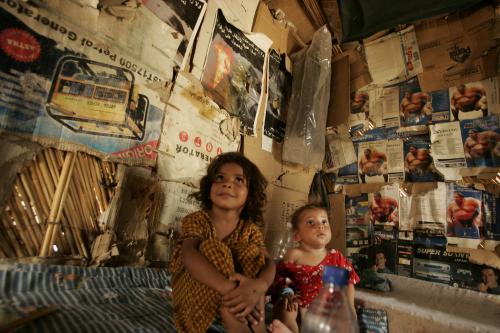“Like a thief, I work in the dark," said GS, a humanitarian aid coordinator for a foreign NGO which is assisting orphans. "I live in fear for offering help - what an irony.”
Foreign and local humanitarian aid workers in strife-torn Iraq face constant danger from militant groups whose targets include Western agencies and their local staff. The latter are deemed an extension of the US-led forces by some extremists.
Foreign aid groups flocked to the country after the 2003 US-led invasion and thousands of local NGOs were established. However, the subsequent violence forced many to pull out or keep a low profile, and they have increasingly switched from direct implementation of programmes to a form of remote oversight from neighbouring countries or the relatively peaceful north.
This has led to serious inefficiencies and inadequate operational capacity on the ground, according to a report, 'More Challenges Ahead for a Fractured Humanitarian Enterprise', by the US-based the Feinstein International Center early this year.
“We used to have eight offices scattered nationwide, with the main office in Baghdad, but since early 2005 all offices have been closed and international staff have been relocated to Jordan; international staff depend on locals on the ground who work from home,” GS said.
“The deteriorated security situation from 2005 to 2007 made it impossible to reach all those who needed our help; our work was limited to some parts of Baghdad and some relatively peaceful cities outside it,” he added.
During this period, GS and his colleagues in Baghdad and the provinces, sometimes relied on local tribal leaders, government officials or community dignitaries to reach beneficiaries.
| Read more |
Local and foreign humanitarian organizations were attacked by militants - with assassinations, kidnappings, bombs and car bombs.
The first of these was in August 2003 when a suicide bomber drove a large truck packed with explosives into the UN headquarters in eastern Baghdad, killing at least 23 people, including UN senior representative Sergio Vieira de Mello.
This forced the UN mission to run all its operations from neighbouring Jordan for a few years. Later it returned to Baghdad - but to the fortified Green Zone where key Iraqi government offices and the US and UK embassies are located.
Also in 2003 a suicide car bomber attacked the main office of the International Committee of the Red Cross (ICRC) in Baghdad killing 12 people, including two ICRC employees. ICRC withdrew its entire mission to Amman, Jordan.
A high-profile kidnapping and murder of a British aid worker took place in 2004 when militants seized Irish-born 59-year-old Margaret Hassan as she went to work in Baghdad. Hassan, who was married to an Iraqi and had lived for 30 years in Iraq, served as the country director of CARE International.
Nearly two years later, gunmen disguised in Iraqi army uniforms burst into the Iraqi Red Crescent Society offices in western Baghdad and kidnapped 25 employees and volunteers. Six were later released while the others were either killed or are still missing.
Despite a decline in violence since late 2007, NGOs have not rushed to return: “It is still too early to resume our previous activities and reopen all eight offices,” GS said.
No chance to gain experience
The absence of the UN and international NGOs has deprived Iraq’s nascent NGO community of contacts and the chance to build up experience of aid work.
“Most Iraqi NGOs lost a golden opportunity to be in touch with international aid workers… to learn international standards of aid work,” said Nidhal Amer Mohammed, an aid worker with the local Basra-based al-Zahraa NGO, which works on women’s issues.
“To be in touch with international NGOs on a daily basis is vital,” Nidhal said. “Emails or phone calls or training courses once or twice a year outside Iraq can’t help develop the fledgling Iraqi NGO community… I think this has led some local NGOs to lose direction or fall under the influence of particular political parties.”
Remote programming
Greg Hanson, the author of the Feinstein International Center report, predicted an upsurge in violence and said NGOs needed to find ways other than remote programming to carry out their work.
He noted that remote programming, keeping a low profile and “bunkerization” – where aid workers protect themselves with highly visible security - were leading to a loss of proximity to affected Iraqis, and a fragmented delivery of humanitarian services.
“Whilst remote programming options have kept the aid pipeline into Iraq open, it has been an increasingly imperfect and inefficient way to work,” Hanson said.
He said one of the effects of remote programming had been the “inadvertent institutionalization, over time, of the geographic and psychological gaps between those in remote management roles and their counterparts on the ground inside Iraq... The emergency mindset that comes from living and working among people in need is more difficult to maintain at a distance.”
sm/cb/oa
This article was produced by IRIN News while it was part of the United Nations Office for the Coordination of Humanitarian Affairs. Please send queries on copyright or liability to the UN. For more information: https://shop.un.org/rights-permissions





